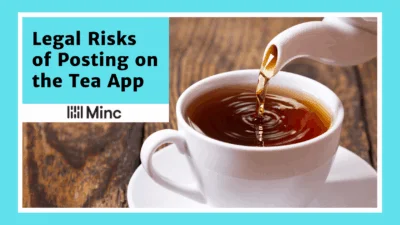
- Originally Published on July 28, 2025
What to Know Before Posting on The Tea App: Legal Risks Explained
Anonymous gossip apps can feel like a safe space to share experiences and opinions, but they also carry significant legal risks. Perhaps you are considering posting about a bad experience with someone on The Tea App, or maybe you have already shared something and are now facing threats of legal action. In these situations, it is crucial to understand your rights and potential liabilities.
If someone is threatening to sue you over a post you made on The Tea App, we recommend taking the following steps:
- Do not ignore the threat,
- Do not engage with the plaintiff publicly,
- Preserve evidence of the situation,
- Remove the post from the platform, and
- Seek legal advice from a defamation attorney.
In this article, we explain what The Tea App is and the legal risks it poses for users. We also explore important legal considerations to keep in mind before posting on the platform and how to respond if you are being threatened with a lawsuit.
What is The Tea App?
Tea, officially known as Tea Dating Advice, is a women-only mobile application that provides an online community for women to support one another and navigate the dating world. The app was first released in 2023 and, as of July 2025, the app developers claim it has over 4.6 million users.
The platform enables users to upload, view, and comment on photos of men, access men’s public records, and conduct image searches of men. It also provides the ability to rate and review men, as well as a group chat function. Users are required to be women and must submit their photo to access the app. According to the company, the requirement to upload an ID was removed in 2023; however, users are still required to provide verification photos.
The Tea App operates as a “whisper network” application, allowing women to share information about men they are currently dating, have dated in the past, or are interested in dating. Posts on the platform often include photos, screenshots of text conversations, dating app profiles, or other identifying information about the subjects being discussed.
How The Tea App Works
The Tea App allows users to post about men in their area, often including:
- Dating experiences and relationship information
- Photos and identifying information about individuals
- Reviews and ratings of men’s behavior
- Screenshots of conversations or dating profiles
- Public records information and background checks
According to the app’s terms of service, users must represent and warrant that any content they submit is truthful and not misleading, and that they have all rights necessary to post such content. The platform states that its contents are for informational purposes only and that the company makes no warranty regarding the accuracy of any information. Additionally, the company does not prescreen content uploaded by users.
While the app provides user anonymity within the platform, it is essential to recognize that true online anonymity is extremely challenging to achieve. Posts can often be traced back to their creators through various technical means, and the app itself maintains records that could be subpoenaed in legal proceedings.
Legal Considerations Before Posting on The Tea App
While The Tea App may feel like a consequence-free environment for sharing information about dating experiences, it can quickly become a legal minefield. Before posting about someone on the platform, it is essential to understand the potential risks and legal implications.
It is easy to feel anonymous and untouchable on a platform that provides user anonymity, but this feeling rarely reflects reality. Just because the app allows anonymous posting does not mean your posts cannot be traced back to you. Unless you are using sophisticated privacy tools, your posts can usually be linked to your device, location, and identity through various technical means.
It is safe to assume that anything you post will eventually be seen by the person to whom you are posting. The Tea App’s terms of service require that content be truthful and not misleading. If you choose to post on The Tea App, ensure that you speak the truth, backed by facts and evidence. Do not make assumptions, exaggerations, or share unverified information.
Below, we explore the key legal risks and considerations to keep in mind when deciding whether posting is worth the potential consequences.
Defamation
In the U.S., your right to free speech is protected by the First Amendment. But that right is not absolute; you do not have the right to defame others.
Defamation is generally defined as a false statement, communicated to a third party, that damages the subject’s reputation. Sharing a true experience on The Tea App is unlikely to constitute defamation. But if you give in to the temptation to embellish your story, fabricate details, or share unverified rumors, you might be liable for defamation if your statements harm the subject’s reputation.
The anonymous nature of The Tea App does not protect you from defamation claims. Courts can and do order platforms to reveal user information when legitimate legal claims are filed. Remember that you are ultimately responsible for what you post, regardless of the platform’s anonymity features. The Tea App’s terms of service explicitly state that users must ensure their content is truthful and not misleading.
Online Harassment
Another significant risk of posting on The Tea App is inciting online harassment against the subject. Unfortunately, anonymous platforms can often become hostile toward the people named in posts. Users may pile on in the comments, share posts to other platforms, and escalate situations into cyberbullying and toxic behavior.
The Tea App’s terms of service prohibit users from using the platform to harass, threaten, or intimidate individuals, and prohibit the use of information from the service for such purposes. However, once information is posted, it can be difficult to control how others use it.
Legally, harassment is defined as targeting an individual with repeated, distressing behavior that threatens their safety or mental health. If your post and any ensuing harassment cause the subject real-world suffering, the victim may have both criminal and civil claims against you, even if you did not directly participate in the harassment that followed your initial post.
Doxxing
Often part of a larger harassment or cyberbullying campaign, doxxing (or doxing) occurs when someone’s identifying information is shared online without their consent. This information may include their full legal name, employer, contact details, address, and other personal details.
Doxxing is a dangerous activity that can often result in real-life harm and harassment. If you include identifying information about someone in a Tea App post, or if your post leads others to share such information, you could be legally liable for doxxing them.
Many Tea App posts include screenshots of dating profiles, social media accounts, or text conversations that contain identifying information. Even sharing someone’s first name along with their photo and location details could constitute a form of doxxing, especially in smaller communities where individuals can be easily identified.
Invasion of Privacy
Invasion of privacy is also known as the publication of private facts. This legal concept includes publicly sharing a person’s private information, portraying them in a false light, intruding on their solitude, or misusing their name and likeness.
Keep in mind that posting content to The Tea App can constitute an invasion of the subject’s privacy, even if the contents are true. For example, sharing private information about someone’s personal relationships, financial situation, health issues, or sexual orientation could constitute an invasion of privacy.
Screenshots of private text conversations, dating app messages, or social media posts that were not meant to be public can also give rise to privacy claims, particularly if they reveal embarrassing or sensitive information about the subject.
Revenge Porn and Non-Consensual Intimate Images
One of the most serious legal risks on platforms like The Tea App involves sharing intimate or sexual content without consent. Revenge porn laws exist in most states and make it illegal to share intimate images of someone without their permission, even if you originally obtained the images legally.
This does not just apply to explicit photos. It can also include:
- Screenshots of intimate text conversations
- Photos from dating apps that show someone in revealing clothing
- Private images shared during a relationship
- Any content of a sexual nature shared without consent
Revenge porn charges can result in both criminal penalties and civil liability. Many states have specific laws addressing non-consensual sharing of intimate images, with penalties that can include jail time, fines, and mandatory registration as a sex offender.
Copyright Infringement
Many Tea App posts include screenshots of social media posts, dating profiles, text conversations, or photos that belong to other people. Sharing these images without permission can constitute copyright infringement, particularly if the original creator holds copyright to the content.
The Tea App’s terms of service specifically prohibit posting content that violates or infringes the rights of third parties, including copyright. While social media posts might seem like fair game, the person who created the content (took the photo, wrote the post, etc.) typically holds the copyright. Sharing their content without permission, especially in a context that could harm their reputation, may violate their intellectual property rights.
This is particularly relevant when sharing:
- Photos from someone’s social media accounts
- Screenshots of dating app profiles
- Private photos or images
- Creative content like artwork or writing
Intentional Infliction of Emotional Distress
If a post on The Tea App is outrageous or extreme enough, it could give rise to a claim of intentional infliction of emotional distress. This legal concept applies when someone’s conduct is so extreme and outrageous that it causes severe emotional distress to another person.
Keep in mind that the subject of your Tea App posts could sue you for causing emotional distress if your content sufficiently harms their mental and emotional health. This is particularly relevant for posts that:
- contains false and damaging allegations
- Lead to widespread harassment or bullying
- Expose deeply personal or embarrassing information
- Target someone’s professional reputation or livelihood
What to Do if Someone Threatens Legal Action Over Your Tea App Post
Social media posts can have a profound impact on a person’s real-world life and reputation. The anonymous nature of The Tea App does not protect you from legal consequences. Courts regularly order platforms to reveal user information when legitimate legal claims are filed, and there are various technical methods for identifying anonymous posters.
If you are being threatened with a lawsuit due to something you posted on The Tea App, it is essential to act quickly and strategically. Below, we provide actionable steps to protect yourself in the event of a potential legal dispute.
Do Not Ignore the Threat
While it might be tempting to dismiss a legal threat as empty bluster, it is important to take it seriously. It is increasingly common for people to file lawsuits over anonymous social media posts, and courts are becoming more willing to unmask anonymous posters when legitimate claims are presented.
Ignoring the threat could lead to legal actions being taken against you without your prepared defense. Do not ignore a cease and desist letter if you receive one. Similarly, it is crucial not to ignore a summons and complaint if a lawsuit is actually filed. If you do, you could face serious consequences, including a default judgment being entered against you.
Contact an attorney as soon as possible to discuss your options and how to resolve the situation in your favor.
Do Not Engage Publicly
While you may want to defend yourself if you are being accused of defamation or harassment, avoid the temptation to respond publicly. Do not discuss the threat or the situation on social media, including The Tea App itself. Remember that any public statements you make can be used against you in legal proceedings.
Preserve Evidence
Make sure to keep copies of the original post and any other relevant documentation. You should also preserve all interactions and correspondence related to the threat, such as emails, letters, direct messages, and any communications from the platform itself.
This evidence could be crucial in any legal proceedings. Take screenshots of:
- Your original post and any comments
- Any messages or communications from the subject
- Cease and desist letters or legal threats
- Any evidence supporting the truthfulness of your post
- Communications with The Tea App or other platforms
Remove the Post
Once you have saved copies of the post and related evidence, consider removing the post from The Tea App. While removing a post does not stop someone from suing you over it, deleting the offending content can demonstrate to a court that you tried to mitigate any harm it caused.
However, do not remove the post without first consulting with an attorney and preserving evidence. In some cases, removing content too quickly can be seen as an admission of wrongdoing, while in other cases it is the right strategic move.
Seek Legal Advice
Finally, contact a legal professional who specializes in defamation, privacy, or internet law. They can advocate on your behalf while providing advice tailored to your specific situation, including whether the threat has legal merit and how best to proceed.
There is no one-size-fits-all approach to handling these types of matters, and the specific content of your post will dictate how an attorney can best navigate your situation. If you received a cease and desist or retraction demand letter, an experienced attorney can review the letter and respond on your behalf. They can work to negotiate a resolution that protects your interests.
If you were served with a defamation lawsuit, an attorney can respond by filing an answer or motion to dismiss on your behalf, potentially getting the case thrown out early in the process.
If you are being threatened with a lawsuit over a post on The Tea App or are considering posting something that may have legal implications, please do not hesitate to reach out to us. In most situations involving anonymous gossip platforms, the best solution for both parties is often a mutual resolution that allows everyone to move forward without the expense and stress of litigation.
At Minc Law, our experienced legal team knows how to resolve social media disputes while minimizing both cost and emotional distress. We understand the unique challenges posed by anonymous platforms and have extensive experience helping clients navigate these complex situations.
Whether you need help responding to a legal threat, understanding your rights before posting, or defending against a lawsuit, we are here to help. You can contact us by filling out our contact form below or calling us at (216) 373-7706.
Remember: the best defense against legal trouble is understanding the risks before you post. When in doubt, consult with an attorney before sharing potentially damaging information about others online.
Get Your Free Case Review
Fill out the form below, and our team will review your information to discuss the best options for your situation.
This page has been peer-reviewed, fact-checked, and edited by qualified attorneys to ensure substantive accuracy and coverage.


